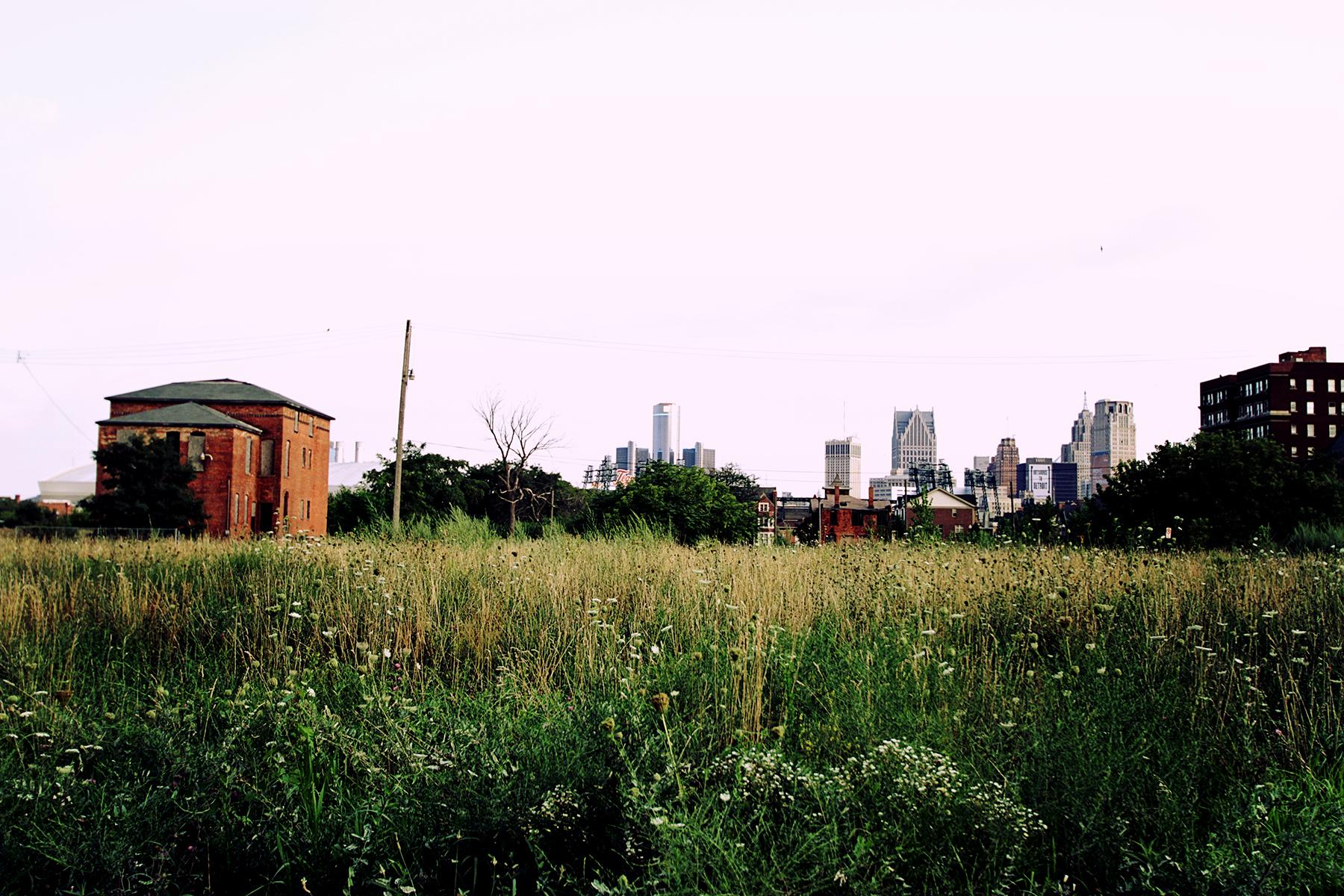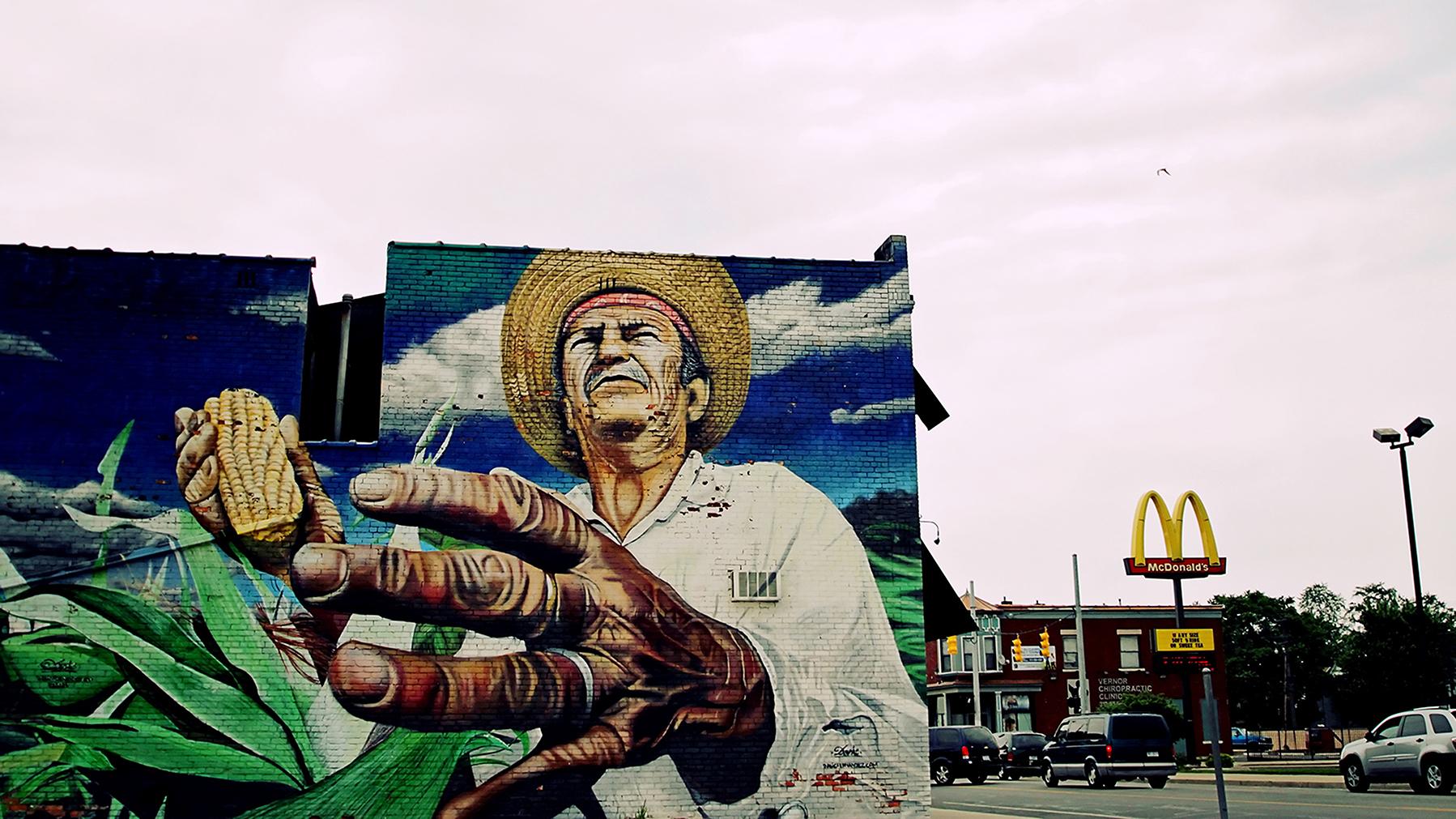Black farmers in Detroit are growing their own food. But they’re having trouble owning the land.
A mural on Vernor Hwy. in Detroit, Michigan. The city's poorest neighborhoods have ready access to fast food, but lack fresh produce and healthy eating options.
Lorenzo Herron is a 26-year-old Detroit native and urban farmer. His degree in agribusiness from Michigan State University brought him back to Detroit in 2012, where he began growing cherries, raspberries, strawberries and mulberries on the city's east side.
"Growing fruit is the least amount of work," he says. "You don't have to baby fruit; most crops need a lot of pampering and are super-needy."
Herron grows fruit to share with his community. He says he can't farm full-time because farming doesn't pay the bills.
"People are not used to not paying the real price of food," he says. "Industrial agriculture is subsidized and competes with everyone. It makes our jobs as small urban farmers almost impossible to live off of."
After more than three years of trying to purchase plots of land in Detroit, he's been unsuccessful. He's not alone; there are dozens of cases of people attempting to buy land without success. Herron says that the property he was interested in buying, for example, belongs to a holding company in Florida.
The frenzy of speculators, outside and foreign investors to purchase Detroit land has shut people out of buying in their own neighborhoods.
One of the most controversial land sales involved investment banker John Hantz. In 2012, Hantz and his company, Hantz Farms, were allowed to purchase 140 acres of what many consider prime real estate for far below market rate. Despite strong opposition from a coalition of urban farmers, community activists and local residents, Detroit's city council approved the contested land deal in a 5-4 vote. According to Crain's Detroit Business, Hantz acquired "slightly more than 1,500 non-contiguous city-owned lots for $520,000, or about $300 per lot."
Last year, Herron and a group of east side farmers met with mayor Mike Duggan about creating a land trust, a private agreement where the city would agree to hold the title to the property for the benefit of community. But the farmers haven't made headway in purchasing land, says Herron.
"To become a land holder in effect is out of reach for black farmers," he says.
Detroit has enough territory to comfortably fit all of Manhattan, Boston and San Francisco. The population of the city has fallen from a peak of nearly 2 million in the 1950s to around 680,000 today. It should be easy to procure land for farming in a city with so much available acreage. But it's not.

Bureaucratic obstacles, a historically dysfunctional city government and land speculators keep would-be farmers in Detroit from easily purchasing the abundance of neighborhood plots in Detroit's so-called prime neighborhoods.
Just ask urban farming pioneer Malik Yakini, executive director of the Black Food Security Network. He is a longtime crusader in the black urban agriculture movement. For years, he has been teaching about the scarcity of African American farmers, the troubled history of racial discrimination and how that played a big role in driving blacks off their land in southern states.
"If we want to increase the quality of life for black people, we need land to do that," Yakini says. "We have gone backwards — black-owned land has decreased significantly since its peak in 1910."
According to the US Department of Agriculture, in 1910, African Americans owned nearly 20 million acres of land in the United States, much of it rural farmland. Today, that figure has dropped to less than 8 million acres.
Yakini began using a small piece of empty land to build D-Town Farms, a now sprawling seven-acre farm on the city's west side. The acquisition of the property was the result of more than two years of meetings and negotiations with the Detroit City Council and the city's Planning and Recreation Departments. D-Town Farms doesn't own the acres; they are in a 10-year license agreement to use the site for $1 annually. The agreement ends in 2018.

To deal with such matters, the state of Michigan created the Detroit Land Bank, a public authority dedicated to returning Detroit's vacant, abandoned and foreclosed property to productive use. One of the hallmark programs of the Detroit Land Bank is a side-lot buying initiative, which allows homeowners to buy an empty plot of land next to their home.
"It's becoming easier, certainly in the case of buying side lots," says John Roach, director of communications for the City of Detroit. "The land bank has sold 4,000 side lots that sell for $100."
But those 4,000 lots and 650 structures sold by the program is a fraction of the 97,000 parcels still owned by the city. The sale of side lots also does not help people who want to purchase property that is not directly next to their home.
Craig Fahle, director of public affairs at the Detroit Land Bank Authority, says that they are trying to create a program for residents to lease parcels of land with permission from their local block clubs. It would cost just $25 per year to lease the land for gardening and recreation. The program, however, has yet to be put in front of the city council.
"Communities most often use lots that don't belong to them to grow vegetables, yet when it becomes economically advantageous for the owner to sell, the garden goes," says national farm activist and educator Leah Penniman. "If we want a stake in the process of controlling our own life, we've got to own land. If we are to create a society that values black life, we cannot ignore the role of food and land."
Fighting food apartheid
Many of reasons why the city's urban agriculture movement is flourishing are deeply rooted in race. Today, 83 percent of Detroit's population is black, a consequence of white flight that began in the 1950s. Many black residents also began leaving the city about 15 years ago, as the auto industry collapsed.
As Detroit lost population, it also lost supermarkets — especially in poorer, blacker neighborhoods. In a city where almost one-third of Detroiters don't own a car and where passengers often wait over an hour at bus stops, getting fresh fruits and vegetables became an almost impossible task for many people in the city. There are now more than 1,500 farms in Detroit, ranging from small backyard gardens to full-scale urban farms, according to local group Keep Growing Detroit.
"Food is essential to a quality life, and the fact that it is not available to black people is disheartening and crushing," says Bianca Danzy, a student farmer at the urban farm Earthworks.
She's been helping to grow food since she was a child, a lifestyle her grandparents taught her when they migrated north from Louisiana and Mississippi. After years of growing vegetables in her own garden, Danzy has become deeply involved in the urban agricultural movement. As a wife and mother she says she's determined to keep her children out of the cycle of poverty by eliminating unnecessary spending in retail stores and producing what food she can in her garden.
"Growing your own food is self-determination, food that you put in the ground, you grew and you then prepared," Danzy says. "[It] nourishes you and detaches you from the need to go and pay a food bill. Growing food should be a life skill. If you know how to brush your teeth, you should know how to grow squash."
Like Danzy, most African American Detroiters have Southern roots. By 1960, more than 400,000 African Americans had moved to Detroit as part of the Great Migration. Black Southern sharecroppers and tenant farmers brought their agricultural know-how to urban centers.
But farmer Jerry Ann Hebron says that African Americans ran away from farming. "We're not proud of our heritage, because it was sharecropping," she says. Hebron is the Executive Director of the North End Christian Community Development Corporation, a nonprofit organization that provides healthy lifestyle and diverse cultural, educational programs.
"Sharecropping became something not to be proud of — most people of color look at it like it was degrading to be a farmer," she says.
The city's African American farming movement first sprung to life in the 1980s, as supermarkets began closing their doors. But it was galvanized by the 2007 closure of Farmer Jack, the city's last large grocery store chain. Fast-food and corner stores selling junk food became a much easier mealtime solution. One study found that 80 percent of city residents rely on these "fringe" food retailers for their food purchases. City residents began working together to advance their shared political and social ideas about the lack of healthy, culturally appropriate food.

Also: Advocate says race is a dominant indicator of pollution — not just in Flint
Marilyn Nefer Ra Barber teaches urban farming classes at Earthworks on Detroit's far-east side. Five days per week, would-be farmers, including Bianca Danzy, gather inside a community hall to learn the basics of agronomy, of cultivating land and growing vegetables. She has been farming in Detroit for nearly 15 years; she started gardening with her parents as a child. But as the supermarkets around her disappeared, her hobby became a political cause.
"The black community has every fast-food restaurant available to them, but they don't have access to fresh produce. People are forced to eat food from corner stores, gas stations and liquor stores," Ra-Barber says. "We thought it was important for black children to build a community of self-reliance."
In 2013, Whole Foods opened in downtown to much fanfare. Meijer's, a Michigan based grocery store followed suit and opened two locations. It's big news in the city, but these new stores are too far to serve many of Detroit's poorest neighborhoods. African Americans especially are still looking for regular and permanent access to healthy food. And the farms are one way they provide it for themselves.
"Black communities couldn't depend on grocery stores," Ra Barber says. "We couldn't wait and see if the supermarket chains would come back. We had to take matters into our own hands."
